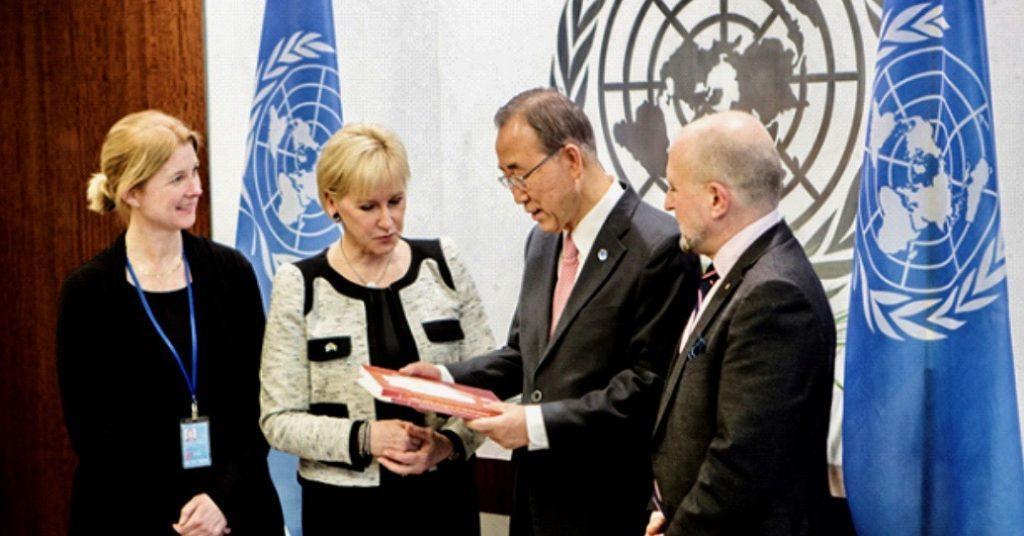A Project for Peace
The Challenges Forum Platform was launched in 1996 in response to the increase in number of peacekeeping missions during the 1990s. Challenges faced in regional conflicts around the world called for intensified efforts to analyse and reflect on the international community’s role in this new context.
Founded in 1996 by Ms. Annika Hilding Norberg, a then research student at the London School of Economics and Political Science, the Challenges Forum was developed as part of her doctoral thesis, in close cooperation with the Swedish Defence College, Russian Public Policy Centre, Institute of Diplomacy of the Hashemite Kingdom of Jordan and the North Atlantic Treaty Organization (NATO).

The first seminar was held in 1997 at the Swedish Defence University on the theme Challenges of Peace Support: Into the 21st Century. It aimed to explore effective and legitimate resolutions to regional conflicts in recognition of emerging challenges faced in peace operations.
Between 1999 and 2002, a series of Challenges Forum initiated events were conducted that focused on United Nations peacekeeping policy and reform. They attracted military as well as civilian personnel and researchers in the field of peace operations. 230 organisations in 50 countries were represented. A concluding report, Challenges of Peace Operations: Into the 21st Century, was presented to the United Nations Secretary-General at a high-level seminar in New York. It addressed 14 areas of inquiry with 69 recommendations directed at troop- and police contributing countries to peace operations.
The period saw an increase in number of Challenges Forum partner organizations as part of a wider global constituency. A set of issues identified in the 2002 report were addressed under the overarching theme Meeting the Challenges of Peace Operations: Cooperation and Coordination. Examples of topics addressed were Regional dimensions of peace operations; the Rule of law; and Education and training.
2006 marked the formalisation of the partnership into The International Forum for the Challenges of Peace Operations. The establishment of the Challenges Annual Forum as main yearly event followed in 2008, another significant milestone in this period. It was hosted by the French Ministry of Foreign and European Affairs and the French Ministry of Defence as part of the France’s EU Presidency agenda.
Partner organizations in cooperation with colleagues in their regions host all but one of the workshops in the ensuing series (2006-2008).
In consultation with UN DPKO, the Partnership conducts a study to operationalize UN Principles and Guidelines for mission purposes in ten workshops and meetings (2009-2011). The Challenges Forum Considerations for Mission Leadership in UN Peacekeeping is published and used globally in senior mission leadership courses.
Former USG DPKO Jean-Marie Guéhenno is now the Challenges Forum’s Patron.
Challenges Annual meetings are hosted by Egypt, Switzerland and Argentina (2011-2013).
In 2014, the Challenges Forum contributes to the consultation process in support of the High-level Independent Panel on Peace Operations through Challenges Annual meetings in China and Armenia, and through a Challenges Forum seminar in the US.
The 20th Anniversary of the Challenges Forum’s Partnership was held in recognition of challenges and achievements in UN Peace Operations in recent years. The Partnership’s focus is steadfast to make peace operations more effective and to meet the challenges of the 21st Century.
2017 marked the launch of a revision of the Challenges Forum partnership’s UN Peace Operations leadership guidance, Considerations for Mission Leadership in United Nations Peacekeeping Operations. The Considerations Study was first published in 2010 and has since then been used globally in senior mission leadership courses in the UN, AU, EU, ECOWAS and by national governments.
The Annual Forum 2017 was hosted by the Centre for Strategic Studies (SAM) at the Ministry for Foreign Affairs of Turkey. The forum was dedicated to mission leadership and provided important insights for the revision of the Considerations Study. Also, at the Partner Meeting, partners decided to activate the Partner Organizations’ Advisory Committee, providing support to the International Secretariat, improving governance and increasing transparency of daily operations. For its first period 2018-2019, the United Service Institution (USI), India; Australian Civil-Military Centre (ACMC); Institute for Security Studies (ISS), South Africa; and Peacekeeping and Stability Operations Institute (PKSOI), USA, joined as members.The Challenges Annual Forum 2018 was held in Stockholm in November on the theme `Action for Peacekeeping: Strengthening the Effectiveness of Future Peace Operations´. Recommendations on how to implement the UN Secretary-General’s agenda were presented at a briefing to the Special Committee on Peacekeeping Operations (C-34) in January 2019.

